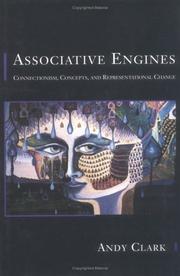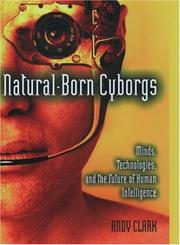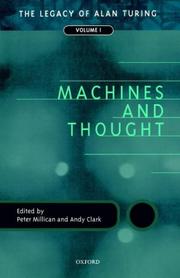| Listing 1 - 4 of 4 |
Sort by
|

ISBN: 0262032104 0262513773 0585023387 0262270420 9780262270427 9780585023380 9780262032100 Year: 1993 Publisher: Cambridge, Mass. MIT
Abstract | Keywords | Export | Availability | Bookmark
 Loading...
Loading...Choose an application
- Reference Manager
- EndNote
- RefWorks (Direct export to RefWorks)
Connectionist approaches, Andy Clark argues, are driving cognitive science toward a radical reconception of its explanatory endeavor. At the heart of this reconception lies a shift toward a new and more deeply developmental vision of the mind - a vision that has important implications for the philosophical and psychological understanding of the nature of concepts, of mental causation, and of representational change.Combining philosophical argument, empirical results, and interdisciplinary speculations, Clark charts a fundamental shift from a static, inner-code-oriented conception of the subject matter of cognitive science to a more dynamic, developmentally rich, process-oriented view. Clark argues that this shift makes itself felt in two main ways. First, structured representations are seen as the products of temporally extended cognitive activity and not as the representational bedrock (an innate symbol system or language of thought) upon which all learning is based. Second, the relation between thoughts (as described by folk psychology) and inner computational states is loosened as a result of the fragmented and distributed nature of the connectionist representation of concepts. Other issues Clark raises include the nature of innate knowledge, the conceptual commitments of folk psychology, and the use and abuse of higher-level analyses of connectionist networks. Andy Clark is Reader in Philosophy of Cognitive Sciences in the School of Cognitive and Computing Sciences at the University of Sussex, in England. He's the author of Microcognition: Philosophy, Cognitive Science, and Parallel Distributed Processing.
Cognitive psychology --- Artificial intelligence. Robotics. Simulation. Graphics --- AI(Artificial intelligence) --- Artificial intelligence --- Artificial thinking --- Artificiële intelligentie --- Cognitie --- Cognition --- Connectionism --- Connectionisme --- Connectionnisme --- Connexionism --- Electronic brains --- Intellectronics --- Intelligence [Artificial ] --- Intelligence artificielle --- Intelligent machines --- Kunstmatige intelligentie --- Machine intelligence --- Thinking [Artificial ] --- Psychology --- AI (Artificial intelligence) --- Intelligence, Artificial --- Thinking, Artificial --- Bionics --- Cognitive science --- Digital computer simulation --- Electronic data processing --- Logic machines --- Machine theory --- Self-organizing systems --- Simulation methods --- Fifth generation computers --- Neural computers --- Artificial intelligence. --- Cognition. --- Connectionism. --- Cerveaux électroniques --- Machines intelligentes --- Pensée artificielle --- E-books
Book
ISBN: 0262270447 0585002967 0262530953 0262031485 9780585002965 9780262270441 9780262530958 9780262031486 Year: 1989 Volume: 6 Publisher: Cambridge, Mass. MIT
Abstract | Keywords | Export | Availability | Bookmark
 Loading...
Loading...Choose an application
- Reference Manager
- EndNote
- RefWorks (Direct export to RefWorks)
Parallel distributed processing is transforming the field of cognitive science. Microcognition provides a clear, readable guide to this emerging paradigm from a cognitive philosopher's point of view. It explains and explores the biological basis of PDP, its psychological importance, and its philosophical relevance.
Connectionism --- Human information processing --- Artificial intelligence --- Cognitive science --- Psychology --- Social Sciences --- AI (Artificial intelligence) --- Artificial thinking --- Electronic brains --- Intellectronics --- Intelligence, Artificial --- Intelligent machines --- Machine intelligence --- Thinking, Artificial --- Information processing, Human --- Connexionism --- Bionics --- Information theory in psychology --- Perception --- Cognition --- Science --- Philosophy of mind --- Digital computer simulation --- Electronic data processing --- Logic machines --- Machine theory --- Self-organizing systems --- Simulation methods --- Fifth generation computers --- Neural computers --- Cognitive psychology --- Artificial intelligence. Robotics. Simulation. Graphics --- Theory of knowledge --- Artificial intelligence. --- Intelligence artificielle --- Sciences cognitives --- Connexionnisme --- Information, Traitement de l', chez l'homme --- Connectionism. --- Human information processing. --- Cognitive science. --- COGNITIVE SCIENCES/General --- PHILOSOPHY/General --- Data processing.

ISBN: 0199881987 1280481846 9786610481842 0198033923 0195303105 9780198033929 9780195148664 0195148665 9781280481840 9780195303100 Year: 2003 Publisher: Oxford ; New York : Oxford University Press,
Abstract | Keywords | Export | Availability | Bookmark
 Loading...
Loading...Choose an application
- Reference Manager
- EndNote
- RefWorks (Direct export to RefWorks)
A revolutionary approach to the human mind imagines a future when humans have fully incorporated their tools and technologies into the biological reality of being human. (Science & Mathematics).
Technology --- Neurosciences --- Artificial intelligence --- Human-computer interaction. --- Cyborgs. --- Cybernetic organisms --- Persons --- Computer-human interaction --- Human factors in computing systems --- Interaction, Human-computer --- Human engineering --- User-centered system design --- User interfaces (Computer systems) --- Neural sciences --- Neurological sciences --- Neuroscience --- Medical sciences --- Nervous system --- Social aspects.

ISBN: 0198238762 Year: 2002 Publisher: Oxford Oxford university press
Abstract | Keywords | Export | Availability | Bookmark
 Loading...
Loading...Choose an application
- Reference Manager
- EndNote
- RefWorks (Direct export to RefWorks)
| Listing 1 - 4 of 4 |
Sort by
|

 Search
Search Feedback
Feedback About UniCat
About UniCat  Help
Help News
News